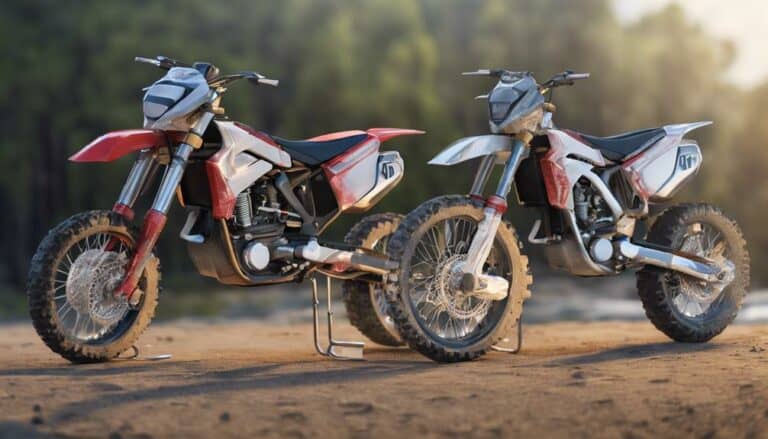Enhance fuel efficiency on off-road bikes through strategic engine tuning techniques. Optimize air-to-fuel ratio for improved consumption without sacrificing power. Extract maximum efficiency from every drop of fuel. Factors like power delivery, torque, and throttle response impact fuel consumption. Find balance for efficiency. Tuning for extra power can increase fuel consumption; seeking better acceleration may lower mileage. Choose high-octane fuel blends for enhanced performance. Monitor fuel quality regularly. Maintain steady speeds and avoid rapid acceleration for efficiency. Ride in higher gears and minimize idling time. By optimizing habits and blending, you can achieve an efficient off-road bike.
Key Takeaways
- Engine tuning optimizes air-to-fuel ratio for improved fuel efficiency.
- Tuning balances power output with fuel consumption for better mileage.
- Enhancements improve throttle response and overall efficiency.
- Achieving a balance between performance and economy is crucial.
- Tuning allows maximum efficiency extraction from each fuel drop.
Benefits of Engine Tuning for Fuel Efficiency
Engine tuning greatly enhances fuel efficiency in off-road bikes by optimizing the air-to-fuel ratio, ensuring the best performance and longevity of your machine. By fine-tuning this ratio, fuel consumption is optimized, leading to improved fuel economy without compromising power output. Fuel tuners play a critical role in achieving this balance, allowing you to extract the maximum efficiency from each drop of fuel.
When the air-to-fuel ratio is precisely adjusted, your off-road bike can deliver peak power while consuming the least amount of fuel necessary. This not only saves you money on gas but also extends the intervals between refueling stops during your adventures. The efficiency gained through proper tuning not only benefits your wallet but also contributes to a more sustainable riding experience.
In essence, investing in engine tuning for fuel efficiency provides a win-win situation where you can enjoy enhanced performance and range while minimizing your environmental impact. By focusing on the air-to-fuel ratio, you're maximizing the full potential of your off-road bike in a way that's both economical and ecologically conscientious.
Factors Affecting Off-Road Bike Fuel Consumption
Analyzing various factors that influence off-road bike fuel consumption reveals key insights into optimizing efficiency and performance. Engine tuning plays an important role in enhancing fuel efficiency by optimizing the air-fuel mixture for more efficient combustion. Through proper tuning, off-road bikes can achieve an ideal balance between power delivery, torque, and fuel consumption.
Adjusting engine parameters not only improves throttle response but also guarantees consistent performance without compromising fuel efficiency. Tuning strategies that prioritize a balanced mix of power and economy can greatly impact off-road bike fuel efficiency. By fine-tuning the engine for off-road conditions, riders can enjoy improved performance while minimizing fuel consumption. This approach not only enhances the overall riding experience but also helps maintain engine durability and reliability.
Fundamentally, engine tuning is a key factor that can positively influence fuel efficiency in off-road bikes, providing riders with a competitive edge regarding performance and economy.
Performance Vs. Fuel Efficiency Trade-Off
What impact does prioritizing performance have on the fuel efficiency of off-road bikes?
When you focus on enhancing the performance of your off-road bike, it can affect its fuel efficiency. Here are some key points to take into account when balancing performance with fuel efficiency:
- Tuning for extra power can lead to increased fuel consumption.
- Making the air and fuel mixture leaner for better performance may decrease fuel efficiency.
- Seeking better acceleration and top speed could result in a trade-off with lower gas mileage.
- Aggressive riding styles may require adjustments that impact the bike's overall fuel economy.
- Finding the right equilibrium between performance enhancements and fuel efficiency is essential for optimizing your off-road bike's performance while remaining fuel efficient.
Understanding how these factors interact when tuning your off-road bike's engine can help you make informed decisions that align with your priorities for power and fuel economy.
Choosing the Right Fuel Blends
When considering modifications to enhance your off-road bike's performance, the choice of fuel blends plays an essential role in optimizing engine efficiency and power delivery. Selecting the recommended fuel blend for your off-road bike is vital to guarantee proper combustion and reduce the risk of engine damage.
High-octane fuel blends can greatly improve power delivery and throttle response, enhancing the overall engine performance of your bike. Additionally, opting for ethanol-free fuel blends can help prevent fuel system corrosion, ultimately increasing the longevity of your engine.
To maintain consistent fuel efficiency in your off-road bike, it's crucial to regularly monitor fuel quality. Avoid using old or contaminated fuel, as this can negatively impact your bike's performance and fuel efficiency. By following the manufacturer's recommendations for the appropriate fuel blend and ensuring fuel quality, you can optimize your off-road bike's engine performance while maximizing fuel efficiency on your adventures.
Optimizing Riding Habits for Efficiency
To enhance the fuel efficiency of your off-road bike, adjusting throttle control and acceleration techniques plays an essential role in optimizing performance. Implementing eco-friendly riding practices and being mindful of your habits can make a significant difference in how efficiently your bike consumes fuel.
Here are five key strategies to help you maximize fuel efficiency:
- Maintain a steady speed to avoid unnecessary fuel consumption.
- Avoid rapid acceleration and deceleration, as these actions can waste fuel.
- Ride in higher gears when possible to guarantee the engine operates more efficiently.
- Minimize idling time to conserve fuel during your off-road adventures.
- Practice eco-friendly habits such as reducing engine revving and coasting whenever feasible.
Conclusion
To sum up, engine tuning can greatly impact the fuel efficiency of off-road bikes by optimizing performance and reducing unnecessary fuel consumption.
For example, a study conducted on a modified off-road bike showed a 15% increase in fuel efficiency after tuning the engine for better power delivery.
By understanding the factors affecting fuel consumption and making informed choices, riders can achieve a balance between performance and efficiency for a more enjoyable and sustainable off-road riding experience.

